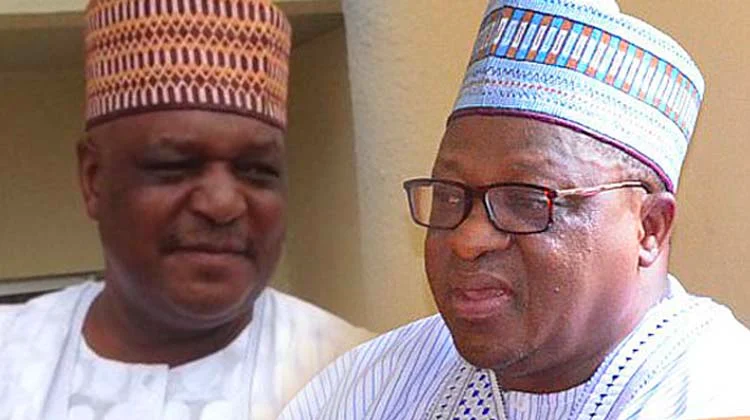Democracy & Governance
Beyond Nyame and Dariye, are Convicted Nigerian Politicians Worth a Pardon? -By Ife O. Olatona
A word from a Nigerian public official – a promise, assurance, or a pardon – deserves scrutiny. In 2015, the first time an incumbent Nigerian president lost a general election, before defeating Goodluck Ebele Jonathan, Buhari’s campaign promised to tackle insecurity, unemployment, and a debilitating educational system. Those promises of change have remained nothing but promises.

The Buhari administration has indubitably failed to meet its promises. It is busy pardoning terrorists and convicted corrupt officials.
On August 8, 2022, the controversial release of a former governor of Plateau State, Joshua Dariye, 64, and that of a former governor of Taraba State, Jolly Nyame, 66, was disclosed to the News Agency of Nigeria. Both were released from the Kuje Custodial Centre after being granted a state pardon by President Muhammadu Buhari in April. Dariye, who served as Plateau’s governor from 1999 to 2007, was sentenced to 14 years in prison for looting public funds worth over 1.1 billion naira. His term was eventually reduced to 10 years while Nyame was to serve a 12-year jail sentence for embezzling 1.64 billion naira.
These men are now free, ridiculing years of investigations conducted by the Economic and Financial Crimes Commission (EFFC), and the judge who convicted them in 2018, Justice Adebukola Banjoko. As Nigeria’s 2023 presidential elections approach ( assuming they hold despite the rise of insecurity nationwide), it is clear that the Buhari administration is one that insidiously trivializes corruption and terrorism.
Despite charges of corruption, Dariye was elected as the senator representing Plateau Central in the Nigerian Senate in 2015. Even more reprehensible is how, according to an April Premium Times report, after Nigeria’s Supreme Court affirmed Dariye’s conviction on March 12, 2021, he filed an application at the Federal High Court in Abuja to retrieve some properties seized as proceeds of corruption.
In the kakistocracy Nigeria has become, gerontic politicians and their families, even after being charged with financial crimes, still uphold political aspirations and dare to run for public office. Of note is Mohammed Abacha, the eldest surviving son of Sani Abacha, a former Nigerian Head of State. Mohammed Abacha, who won the 2023 Kano governorship primaries on the platform of the People’s Democratic Party in May 2022 played an instrumental role in helping his father launder looted funds of about $2.3 billion in the 1990s, as ascertained by Bloomberg. He was arrested in 1999 and held for more than three years over charges of conspiracy and financial crimes, but as of 2022, is gearing towards a governorship election.
Ex-convicts and kleptocrats are easily recycled in Nigeria’s shoddy political ecosystem via retrogressive pardons of convicted corrupt officials like Nyame and Dariye. What future is there in pardoning terrorists and corrupt politicians, if not more of such?
On July 5, 2022, various Nigerian media outlets reported the Minister of Information’s claim that about 1,600 ‘repentant’ Boko Haram fighters had learned trades, reintegrating into the Nigerian society. Shortly after, reports of insurgents attacking the Kuje Custodial Centre, leading to the escape of about 879 inmates, including 68 imprisoned Boko Haram terrorists, surfaced.
A word from a Nigerian public official – a promise, assurance, or a pardon – deserves scrutiny. In 2015, the first time an incumbent Nigerian president lost a general election, before defeating Goodluck Ebele Jonathan, Buhari’s campaign promised to tackle insecurity, unemployment, and a debilitating educational system. Those promises of change have remained nothing but promises.
As of August 2022, the Federal Government is yet to meet the demands of the Academic Staff Union of Universities despite an alarming ongoing strike since February. Public university students and staff are tired, while insurgents are running berserk: the presidential convoy was attacked in July, a June mass shooting occurred at St. Francis Xavier Catholic Church in Owo, eponymously dubbed the ‘Owo massacre’; the March 2022 Abuja–Kaduna train attack killed dozens, and several abductions have taken place. The economy has irrefutably met steep ends, with an unemployment rate as high as 33% and undeniable inflation.
Despite these turmoils, the federal government is busy pardoning terrorists and convicted corrupt officials rather than freeing citizens unjustly jailed.
It is perhaps, typical of Nigeria’s current political leadership anyway: spearheading abysmally dysfunctional ecosystems with minimal foresight, mutating the interests of commoners to communal suffering, necessitating their resilience to systemic oddities, while persistently toeing the unpardonable.
Nigeria is a nation of innumerable resources jeopardized by unpardonable politicians who enjoy national impunity. To hold Nigerian politicians accountable and have them convicted and jailed when corrupt is to uphold a fidelity to scrutiny and justice which Nigeria needs, not a president who pardons and bolsters unconscionable embezzlers.
-
Ife Olatona is a freelance writer from Lagos, Nigeria. His writing has been published in The New York Times and elsewhere. You can find him at ifewrites.com.


















